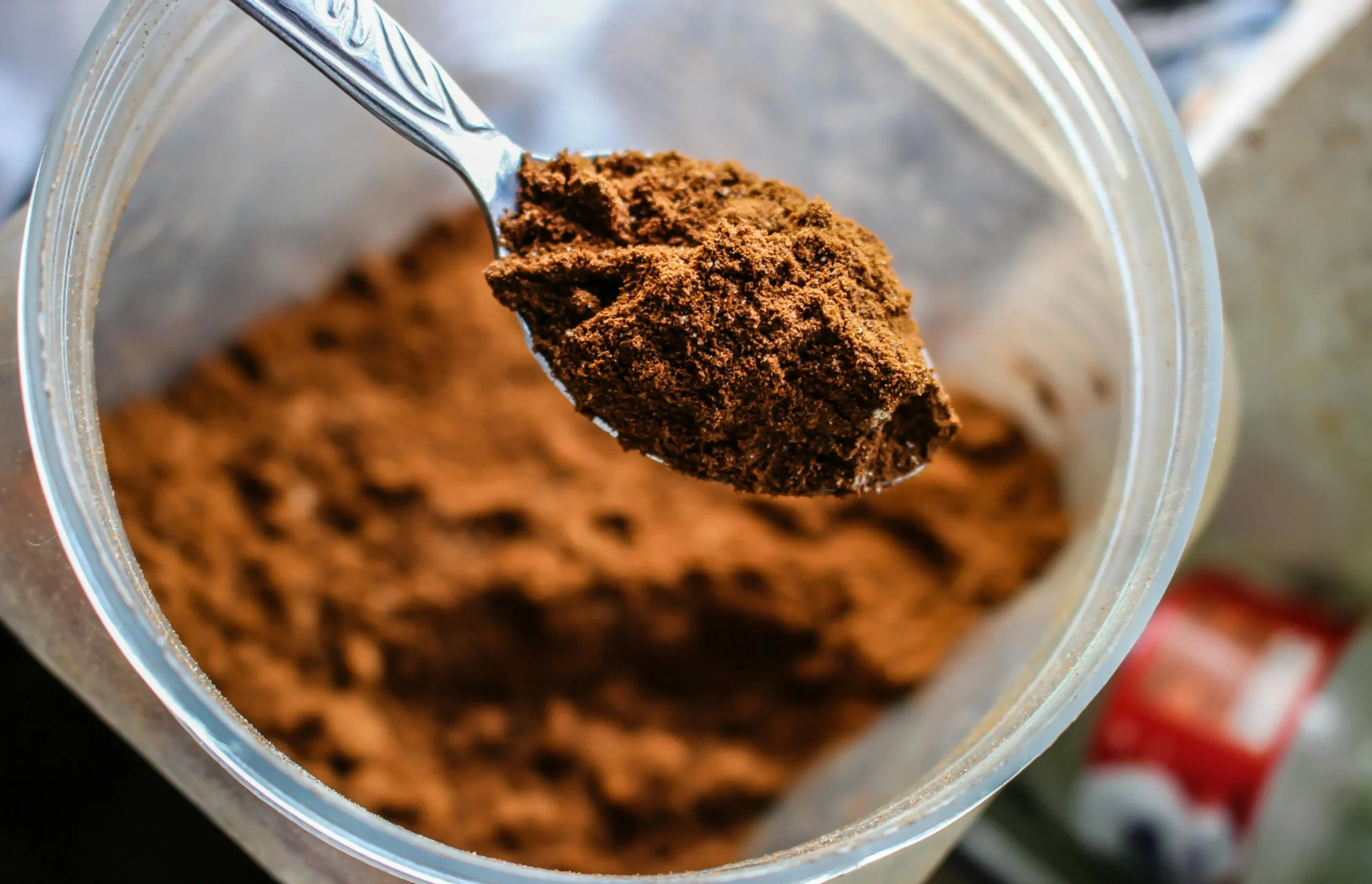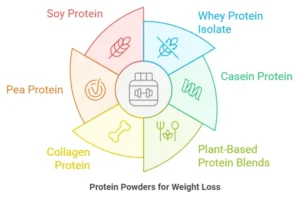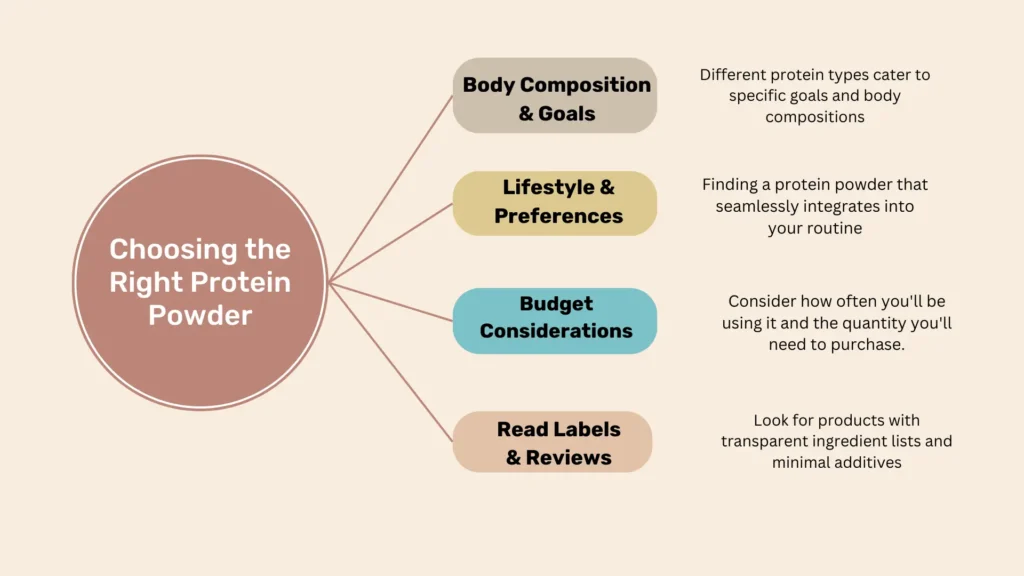Best Protein Powder for Weight Loss Female

When it comes to slimming down, many women are turning to the best protein powder for weight loss as a secret weapon. But with so many choices on the market, it’s vital to understand the ins and outs of different protein powders and how they can support your weight loss goals in the best possible way.
This article explores the different types of protein powders and their potential benefits for weight loss.
What to Look for in a Protein Powder
Protein powder is a powerhouse of protein packed into a convenient form. It comes from different sources like whey, casein, or plants, each with perks. It’s processed into a powder form that can be easily mixed with water, and milk, or added to smoothies and other recipes. It’s important to pick the one that suits your goals and tastes.
Here are some important tips to help you choose the right protein powder that aligns with your weight loss goals:
- Macro-nutrient Content: Protein powders vary in their macronutrient makeup, which includes protein, carbs, and fats. Choosing a protein powder with more protein and fewer added carbs or fats can be smart for weight loss. This way, you get the protein punch you need without extra calories from other sources.
- Ingredient Quality and Purity: Select protein powders with high-quality ingredients and minimal additives, artificial sweeteners, or fillers. Choosing products with a short and transparent ingredient list ensures purity and effectiveness in supporting weight loss efforts. High-quality protein sources provide the necessary amino acids for muscle repair and growth without unnecessary additives that may hinder progress.
- Flavors and Preferences: Personal taste preferences are important for protein powder regimens. Exploring various flavors and forms, such as powder or ready-to-drink shakes, can enhance enjoyment and compliance with your weight loss plan. Whether you prefer classic flavors like chocolate or vanilla or more adventurous options like cookies and cream, finding a protein powder that suits your taste buds is key to sticking with your dietary goals.
- Dietary Restrictions and Allergies: If you have dietary restrictions or allergies, it’s important to read product labels carefully to avoid any allergens or ingredients that could cause problems. Some protein powders contain common allergens like dairy, soy, gluten, or nuts. Choosing products that fit your dietary needs is essential to prevent negative reactions and ensure safety.
- Protein Content and Calorie Count: Checking the protein content per serving and the calorie count of protein powders can guide you in choosing the right ones for weight loss. Aim for products with a high protein-to-calorie ratio. This way, you get enough protein without taking in too many calories, which could slow down your weight loss efforts.
Best Protein Powder for Weight Loss
Incorporating protein powder into your diet can be valuable for your weight loss journey. By understanding the different types and benefits, you can choose the right one to support your goals and enhance your overall health and fitness.

Whey Protein Isolate
Whey protein isolate is a top choice for women aiming to enhance their protein intake while managing calorie consumption.
- Whey protein isolate boasts a higher protein content per serving than other protein sources, typically around 80-90% protein. This allows women to meet their daily protein needs with a smaller serving size.
- Compared to other whey protein options like concentrate, isolate has fewer calories and carbohydrates, making it a better fit for weight management goals.
- Whey protein isolate is readily absorbed by the body, making it ideal for post-workout recovery to support muscle repair and growth.
- The minimal lactose content in isolate makes it a better choice for women with lactose sensitivities than other protein sources.
- Studies suggest protein can help with feelings of fullness and may reduce overall calorie intake throughout the day.
Casein Protein
Casein protein is particularly beneficial for women looking to promote feelings of fullness and preserve lean muscle mass while losing weight.
- Casein protein releases amino acids slowly and steadily, promoting prolonged feelings of fullness and reducing hunger.
- The sustained amino acid release can contribute to muscle repair and growth over extended periods, aiding in maintaining lean muscle mass during weight loss.
- Due to its slow-digesting nature, casein protein is well-suited for nighttime consumption, potentially supporting muscle recovery while you sleep.
- Reduced hunger and muscle preservation might contribute to weight loss by preventing muscle loss and potentially reducing overall calorie intake.
Also, explore How Much Sleep I Need to Lose Weight.
Incorporating casein protein into the nighttime routine is highly beneficial for women looking to optimize muscle preservation and support their weight loss efforts while asleep.
Plant-Based Protein Blends
Plant-based protein blends offer a sustainable and environmentally friendly option for women seeking weight loss.
- Plant-based protein blends align with environmentally conscious choices due to their plant-derived sources.
- These blends offer additional benefits beyond protein, providing fiber for digestive health and antioxidants for overall well-being.
- Blends combine proteins from sources like peas, hemp, or brown rice, offering a complete amino acid profile and catering to a wider range of dietary needs.
- Plant-based blends are ideal for vegetarians, vegans, and individuals with lactose intolerance or other dietary restrictions.
- The combination of protein, fiber, and potentially reduced calorie content can contribute to feelings of fullness and potentially lower overall calorie intake, aiding in weight management.
Collagen Protein
- Beyond weight loss, collagen protein offers potential benefits for skin, joint, and bone health, supporting a holistic approach to wellness.
- While lower protein content, collagen protein boasts a unique composition of amino acids, including glycine and proline, which contribute to collagen formation and may offer other health benefits.
- Though not solely focused on muscle building, collagen protein can be a valuable addition to a weight loss plan by supporting overall well-being and potentially aiding in joint health, which can be crucial for maintaining an active lifestyle during weight management efforts.
Pea Protein
- Pea protein is a plant-based option that is easily digestible and hypoallergenic, making it suitable for those with dietary restrictions.
- It is rich in branched-chain amino acids (BCAAs), which help support muscle growth and maintain metabolic health.
- Blend pea protein into smoothies or use it as an alternative to dairy-based proteins.
Soy Protein
- Soy protein is a complete protein source that contains all essential amino acids, promoting muscle growth and repair.
- It may help reduce body fat and improve body composition with a balanced diet and regular exercise.
- Choose organic or non-GMO soy protein to avoid potential concerns with genetically modified organisms.
Choose a protein powder that fits your dietary and taste preferences, and nutritional goals. Experimenting with different types can help you find the one that best supports your weight loss goals while fitting seamlessly into your lifestyle.
Choosing the Right Protein Powder for You
By assessing your specific needs and goals, you can choose a protein powder that aligns best with your lifestyle and supports your weight loss journey effectively and sustainably. Selecting the most suitable protein powder involves considering individual factors such as body composition, dietary preferences, and budget constraints.

Body Composition and Goals
Selecting the right protein powder can significantly impact your weight loss journey. Different protein types cater to specific goals and body compositions:
- Whey protein isolate is a top choice for women looking to build or preserve muscle mass while shedding pounds. It’s packed with protein and absorbed quickly, making it ideal for your goals.
- If your primary focus is on feeling fuller for longer and preserving lean muscle during weight loss, casein protein is a valuable option. Its slow and steady amino acid release promotes satiety and supports muscle maintenance.
Lifestyle and Dietary Preferences
Understanding how protein powder fits into one’s lifestyle and dietary preferences ensures long-term adherence and success in achieving weight loss objectives.
- Whether you’re a busy professional looking for convenient on-the-go options or a health-conscious individual with specific dietary requirements.
- Busy individuals need options like single-serve packets or ready-to-drink shakes for easy integration into their routine.
- Individuals with specific requirements like vegan, vegetarian, or lactose-free diets choose protein powders that meet their needs.
- Finding a protein powder that seamlessly integrates into your routine is essential for sustainability.
Budget Considerations
While some protein powders may have a higher price tag, budget-friendly options are available without compromising quality or effectiveness. By comparing prices across different brands and considering factors such as serving size and protein content per serving, you can find a protein powder that meets your nutritional needs without breaking the bank.
- When establishing your budget for protein powder, consider the quantity you’ll need to purchase and how you will use it.
- Investing in a higher-quality product may be worthwhile if you plan to incorporate protein powder into your daily routine as a meal replacement or post-workout supplement,
- However, if you’re on a tight budget or only plan to use protein powder occasionally, opting for a more affordable option can help you save money without sacrificing quality.
Reading Product Labels and Reviews
Thoroughly examine product labels and user reviews. This practice can provide valuable insights into the quality and efficacy of different protein powder options.
When shopping for protein powder, prioritize those with clear ingredient lists, few additives, and good customer reviews. This way, you’ll be sure to invest in a high-quality product that gives you the results you’re after.
How to Consume Protein Powder in Your Daily Routine
Incorporating protein powder into daily routines offers versatility and convenience for women striving to lose weight. Here are some effective ways to integrate protein powder into your daily regimen:
Pre-workout Shakes
- Having protein powder before workouts gives you lasting energy and helps your muscles recover and grow better.
- Pre-workout shakes are a fast and easy way to give your body the nutrients it needs to perform at its best and boost muscle protein synthesis during exercise.
Post-workout Recovery
- A post-workout protein shake facilitates muscle repair and replenishes glycogen stores, promoting efficient recovery and adaptation to exercise.
- Consuming protein powder immediately after a workout helps kickstart muscle recovery, reduces muscle soreness, and enhances overall recovery, ensuring you’re ready for your next workout session.
- This study explores the digestion rates and amino acid delivery of whey and casein proteins, shedding light on their distinct benefits and applications in post-workout recovery and muscle building.
Meal Replacement Shakes
- Replacing one or two meals with protein shakes can aid calorie control and portion management, supporting weight loss efforts.
- Meal replacement shakes provide a convenient and nutritionally balanced option for busy individuals looking to maintain a calorie deficit while still meeting their protein needs.
- By incorporating protein powder into meal replacement shakes you can ensure adequate nutrition while keeping calories in check.
Snack Options
- Protein-rich snacks with protein powder offer a convenient and satiating option for curbing cravings and maintaining energy levels throughout the day.
- Whether craving something sweet or savory, protein powder can be easily incorporated into snacks such as protein bars, energy balls, or smoothies.
- These protein-packed snacks satisfy hunger and provide energy to keep you full and satisfied between meals.
By incorporating protein powder into various aspects of your daily routine, you can effectively support your weight loss goals while enjoying the benefits of increased protein intake and enhanced nutrition. Whether it’s pre-workout fuel, post-workout recovery, meal replacement, or snacks, protein powder offers a versatile and delicious way to boost protein consumption and optimize your health and fitness journey.
Benefits of Protein Powders Beyond Weight Management
While protein powder is often associated with weight management, its benefits extend far beyond that. Here’s a detailed look at some of the key benefits it can offer:
- Supports Muscle Growth and Repair: Protein powders provide a concentrated and easily digestible source of protein, which can be especially beneficial for individuals who struggle to meet their daily protein needs through whole food alone. Consuming protein after exercise, particularly resistance training, stimulates muscle protein synthesis, which helps with muscle growth and repair. This can lead to muscle strength, size, and overall physical performance.
- Enhances Recovery After Exercise: Exercise, especially intense activity, can cause muscle breakdown. Protein repairs and rebuilds damaged muscle tissue and aids in faster recovery. Studies suggest that consuming protein powder after exercise can reduce muscle soreness, improve muscle function, and enhance performance in subsequent workouts.
- Provides Essential Nutrients for Older Adults: As we age, our bodies become less efficient at absorbing protein from food. This can lead to muscle loss, also known as sarcopenia. Protein powder offers a convenient way for older adults to meet their increased protein needs, helping to maintain muscle mass, bone health, and overall function.
- Potential Benefits for Blood Pressure and Diabetes: Some research suggests that bioactive peptides in certain protein powders may help lower blood pressure. Protein can also help regulate blood sugar levels. Consuming protein powder after a high-carb meal may help moderate blood sugar spikes, potentially benefiting individuals with type 2 diabetes.
- Reduces Inflammation: Eating protein has been connected to lowering C-reactive protein (CRP) levels in the blood. CRP is a sign of inflammation, and reducing it could lower the risk of chronic diseases linked to inflammation.
- Strengthens Antioxidant Defense: Protein contributes to the formation of glutathione, a crucial antioxidant in the body. Antioxidants help protect cells from damage caused by free radicals, potentially boosting the immune system and reducing the risk of chronic diseases.
Remember that protein powder is a supplement, not a replacement for a balanced diet. While it can offer numerous benefits, it should be used alongside a healthy diet and regular exercise regime for optimal health. Additionally, consulting with a healthcare professional before adding protein powder to your routine is recommended, especially if you have any underlying health conditions.
Tips for Successful Weight Loss with Protein Powder
Achieving weight loss goals with protein powder requires consistency, mindfulness, and attention to detail. Here are some tips to maximize the effectiveness of protein powder in your weight loss journey:
- While protein is essential for weight loss, maintaining a balanced diet rich in fruits, vegetables, and whole grains ensures adequate nutrient intake and overall health. Incorporating nutrient-dense foods alongside protein powder helps provide essential vitamins, minerals, and fiber necessary for optimal well-being and sustained weight loss.
- Consistently incorporating protein powder into your daily routine, whether in your morning smoothie, post-workout shake or as a meal replacement, is key to meeting your protein goals. This is important for sustainable weight loss.
- Regularly tracking progress and adjusting protein intake or exercise routines as necessary promotes continual progress and prevents plateaus in weight loss efforts. By monitoring changes in weight, body composition, and energy levels, you can identify areas for improvement and make necessary adjustments to your diet and fitness regimen to optimize results and keep your weight loss journey on track.
- Consulting with a healthcare professional or registered dietitian ensures personalized recommendations and safe implementation of protein powder for weight loss. A healthcare professional can assess your needs, provide tailored dietary guidance, and address any concerns or questions you may have about incorporating protein powder into your weight loss plan. Their expertise and support can help you navigate the complexities of weight loss and achieve your goals safely and effectively.
Conclusion
Protein powder is valuable for women seeking effective and sustainable weight loss solutions. By understanding the different types of protein powders, considering individual preferences and goals, and implementing practical strategies for incorporation, women can harness the power of protein to achieve their desired physique and improve overall well-being.
In the end, protein powder provides women with a simple and effective method to boost protein intake, promote muscle growth and repair, and improve feelings of fullness—all vital for successful weight loss. By staying consistent, mindful, and paying attention to the details, women can fully capitalize on the benefits of protein powder and set themselves on the path to a healthier, fitter, and happier life.
FAQs (Frequently Asked Questions)
Can protein powder alone help with weight loss?
Protein powder with a balanced diet and regular exercise can support weight loss by promoting satiety, preserving lean muscle mass, and increasing metabolic rate.
Is it safe for women to consume protein powder regularly?
Protein powder consumption is generally safe for women when used as directed and as part of a balanced diet. However, individuals with existing medical conditions or allergies should consult a healthcare professional before starting any new supplement regimen.
How much protein powder should women consume for weight loss?
The recommended protein intake varies depending on individual factors such as age, weight, activity level, and goals. As a general guideline, women aiming for weight loss may benefit from consuming 20-30 grams of protein per serving, multiple times a day, as part of their overall dietary plan.
Are there any side effects of using protein powder for weight loss?
While protein powder is generally safe for consumption, excessive intake may lead to digestive discomfort, bloating, or allergic reactions in some individuals. It’s essential to follow recommended serving sizes and monitor any adverse reactions.
Can protein powder replace whole food sources of protein in a diet?
Protein powder can supplement dietary protein intake but should not entirely replace whole-food protein sources such as lean meats, fish, eggs, dairy, legumes, and nuts. Incorporating protein sources ensures a balanced nutrient intake and supports overall health and well-being.





